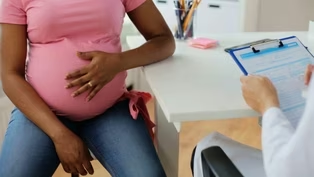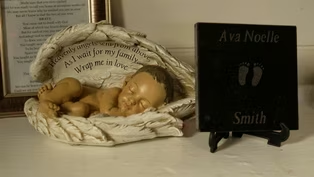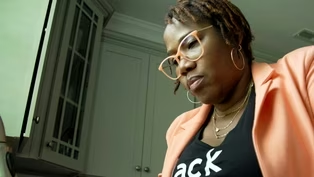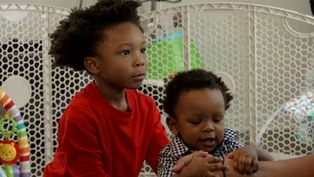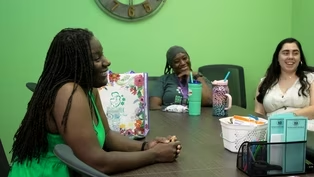
Maternal Health Disparities
3/4/2022 | 27m 29sVideo has Closed Captions
Black mothers and babies are dying at disproportionate rates across the country.
Black mothers and babies are dying at disproportionate rates across the country. It’s a problem that has gotten worse in the past few decades. Numbers from the World Health Organization show that maternal mortality rates more than doubled in the US from 1990 to 2013. ncIMPACT explores local solutions that are working to give black mothers a voice.
Problems playing video? | Closed Captioning Feedback
Problems playing video? | Closed Captioning Feedback
ncIMPACT is a local public television program presented by PBS NC

Maternal Health Disparities
3/4/2022 | 27m 29sVideo has Closed Captions
Black mothers and babies are dying at disproportionate rates across the country. It’s a problem that has gotten worse in the past few decades. Numbers from the World Health Organization show that maternal mortality rates more than doubled in the US from 1990 to 2013. ncIMPACT explores local solutions that are working to give black mothers a voice.
Problems playing video? | Closed Captioning Feedback
How to Watch ncIMPACT
ncIMPACT is available to stream on pbs.org and the free PBS App, available on iPhone, Apple TV, Android TV, Android smartphones, Amazon Fire TV, Amazon Fire Tablet, Roku, Samsung Smart TV, and Vizio.
Providing Support for PBS.org
Learn Moreabout PBS online sponsorship- [Announcer] Coming up on "NCImpact."
Soon to be mothers rely on the health system to guide them in pregnancy, but some women believe they receive inadequate care.
This is "NCImpact."
[mid tempo music] - [Announcer] "NCImpact" is a PBS North Carolina production in association with the University of North Carolina School of Government.
Funding for "NCImpact" is made possible by.
- [Announcer] Changing the course of people's lives.
That's the impact UNC Health and the UNC School of Medicine work to deliver every day.
Our 40,000 team members across the state of North Carolina are committed to caring for you, our patients and communities, as well as educating the next generation of healthcare professionals.
Individually, we can do a little, but collectively we can do a lot to create impact.
- Hello, and welcome to "NCImpact."
I'm Anita Brown-Graham.
In North Carolina, Black, Hispanic, and American Indian babies are more than twice as likely to die before age one than White babies.
And their birth mothers are more likely to experience unexpected birth outcomes with negative health consequences.
That's all according to data from the Centers for Disease Control and Prevention.
"NCImpact's" Evan Howell met with a woman in Lincoln County who believes the health system failed to protect her, while she was pregnant.
And she wants to know why.
[TV voice speaking] - Got you.
- [Evan] In 2018, Jessica Smith was expecting twins when something happened that would forever change her.
- When I turned about 15 weeks, I was having like a lot of pain and I was bleeding a lot, whole lot.
I was going to the doctor, they was telling me that it was normal.
- [Evan] Three weeks later at 18 weeks pregnant, her water broke.
Smith was rushed to the hospital where over the next three days, her life would shift.
- The ER doctor was telling me that he believed that I had a ruptured cyst.
I was telling him that I believe my water broke, but he was telling me, "No, no, I just believe it's too early."
- [Evan] Smith said the doctor told her to use the restroom.
She went while her husband waited out in the hallway.
- I was just screaming, "What's coming outta me?
"Something is coming out of me, "something's coming outta me."
I was calling my husband's name.
He ran into the bathroom.
- [Evan] Staff in the hallway, rushed into help Smith.
They found her a wheelchair to move her down the hallway, back into the emergency room.
- The ER doctor came back in there, he lifted up my cover, he seen my baby halfway outta my body.
And he said, "oh," the S word.
And he was like, "You're having a baby."
- [Evan] Smith was then rushed to labor and delivery where she would give birth to Elijah who was still born.
Smith's second child, Ava, came the next afternoon.
Ava died two minutes after she was born.
- It's definitely something you could have done to save my baby, Ava, but you didn't do it.
That's upsetting.
- [Evan] Smith says what may have helped her second baby is a cervical cerclage, a procedure that closes the cervix with a single stitch that helps prevent preterm births.
- I just don't get it.
I worked in childcare for 10 years also.
I worked right beside a White woman that told me, "Well, I had that same thing happen to me, "but they saved my babies."
And I could ask her, "well, why did they save yours and not mine?"
Okay, come on son.
- [Evan] Smith gave birth in 2019 to a healthy boy, RJ.
She says, she thinks about her twins every day, wishing her son could grow up with his older siblings.
She says, at the end of the day, if African American mothers don't speak up and fight for their babies, the American healthcare system may not hear them.
For "NCImpact," I'm Evan Howell.
- The doctor patient relationship for many is a sacred bond of trust, where the patient relies on the doctor to provide the critical care required.
NCImpact's Evan Howell, introduces us to another mother who had pregnancy complications that went undetected, until it became life threatening for her and her child.
- [Evan] In 2018, a pregnant Tomeka Isaac wasn't feeling well one day.
She initially thought it was food poisoning, and called her sister over to help.
She then passed out.
- I can hear her on the phone with 911, but she was also on the phone with my mother.
So she's on the phone.
My mom's on the phone with me trying to make sure I'm still awake.
Like I don't pass out again.
[sirens wailing] - [Evan] Isaac was rushed to the hospital a month out from delivering a baby boy to be named Jace.
But after nearly nine months of being told, she was having a healthy pregnancy, an ultrasound revealed to Isaac and her husband that their son had died in utero.
- Me and my husband, I remember looking at him and just not knowing what to say, but I could just see...
I mean, I know we looked the same, 'cause we were just heartbroken.
Like, "What are you talking about?"
- [Evan] Doctors also told Isaac that she had HELLP syndrome, a pregnancy complication that affects the blood and liver and can be fatal to both the mother and the baby.
And Isaac believes doctors should have caught it sooner.
- They never did a blood test, they never did a urine sample, they never did anything other than an ultrasound.
And the first ultrasound they did, they said they couldn't see the umbilical cord because he was moving around so much.
- [Evan] In order to save Isaac's life, Doctors had to rush Isaac to a larger hospital for surgeries.
- As I'm in transit, the results from the CT scan reveal that I'm bleeding internally.
- [Evan] Isaac says her story unfortunately is not unique.
In fact numbers from the CDC show that Black women are three to four times more likely to die of pregnancy related complications in the United States, and Black infants are more than twice as likely to die than White infants.
In total, Isaac was in the hospital for 45 days and believes her son's death could have been prevented, had doctors done the necessary tests during her pregnancy.
- I did absolutely everything they asked me to do, and they failed to provide the standard of care for me and my baby to survive my pregnancy.
- [Evan] Isaac and her husband now help raise awareness about the racial disparities in maternal health outcomes, hoping they can take their loss and turn it into change.
For "NCImpact," I'm Evan Howell.
- Joining me now as Dr. Genevieve Neil Perry, who serves at the chair for the UNC department of obstetrics and gynecology.
Genevieve, this is all so sad.
Many, many families know the pain of losing a baby before or after birth.
I certainly do.
But talk to us a little bit about some of the disparities based on race, that you see with maternal and child healthcare outcomes.
- Yeah, these are really both very sad stories, but unfortunately not very uncommon.
There are certainly significant disparities in outcomes that pertain to African-American women, Latinos, Native Americans, from the perspective of pregnancy outcome, as well as preterm delivery, neonatal loss.
These differences range from diabetes, high blood pressure, cardiac disease.
And all of these things can then have an impact on the pregnancy itself, as well as the mom and the baby.
Some of the challenges related to outcomes are...
I mean, they're multifactorial.
Some of 'em are related to socioeconomic status, not having access to care.
Some of 'em are related to not being heard when patients are saying there's something wrong.
And I think you just provided two examples of just that.
And some of it is health literacy, not knowing when to present to the doctor.
And so there are so many different things that have an impact, but even when you control for some of these things, there's still disparities, that seem to be more common for African American women.
So, yeah.
- So talk to us about the role of geography in all of this.
What are some of the geographic disparities that we see?
- So, interestingly enough, and people probably find this hard to imagine that there are two areas where disparities are really prevalent.
One is in the urban center.
And one might think, "Well, why, "you have lots of hospitals in urban settings?"
But the truth is often minorities, Hispanics, African Americans, often going to under resourced healthcare centers, so that even though they're going to hospitals within a city, like New York city, the hospitals they're going to are under resourced, they have higher rates of poor outcomes for patients who attend there.
And then the other place where you have significant disparities in outcome is in rural area.
So again, you have an area where it's under resourced.
You don't have people who are necessarily trained and educated to handle some of the most serious outcomes that you see present to those hospitals.
- Genevieve, thank you.
Thank you so much.
A group of Durham nonprofits, is working together to keep Black mothers and their babies alive and healthy.
NCImpact's, David Hurst, introduces us to this partnership, and joins us in studio with more.
- Anita, these nonprofits have come together to address some of the gaps in maternal health coverage.
These organizations tell me, it takes more than one organization to provide services and resources to mothers, and community collaboration is necessary to get these mothers and their babies, the help and support they need.
[children talking gibberish] Four years ago, Lareeca Sampson gave birth to her first child.
While it was one of the best days of her life, the experience was something she never wants to go through again.
- Allen was actually born on the bathroom floor in my hospital room, in my labor and delivery room.
And so I just didn't want that to happen again.
- Let's move- - [David] While she was pregnant with her second child, she reached out to the nonprofit MAAME, which stands for Mobilizing African American Mothers Through Empowerment.
The organization connected her with a doula, a professional labor assistant, who provided Sampson with physical and emotional support during pregnancy, childbirth and postpartum.
- And having someone else there to advocate for me and to be able to help me, like when I was in a lot of pain, she was able to look at me and help me to focus and change into different positions that would help me labor easier.
- Sampson's doula was Maya Jackson, the founder and executive director of MAAME.
Jackson now trains other doulas who work with mothers from the time they find out they're pregnant up until when the child is two years old.
- We live currently in Durham, in one of the best medically advanced towns in the South, healthcare is deemed exceptional here.
But when you get down to the root and have community conversations, there is a major void that is happening, particularly for Black women and other birthing people of color.
- [David] The doulas ensure their mothers are going to the right providers, and if they're dealing with any high risk complications, they connect them to specialized treatment.
- So we like to work with the medical providers as a team member to ensure that they know what our clients' needs are and what their partner needs are, to ensure that everybody is working together as a team for a better health outcomes.
- [David] And while MAAME's niche is doula support, they rely on their community partners to provide other resources for their mothers.
One of their partners is Equity Before Birth, a nonprofit that provides paid leave and financial resources for Black mothers.
- We know everyone needs support somehow, We were all babies at some point.
We all needed to lean on another human being, and so if there comes the time and this is your time to need support, we want to be able to do that in the smoothest way possible and break down some of those barriers that families are receiving to accessing the care they need.
- [David] For Lareeca Sampson, she credits these organizations for guiding her through a smooth pre and postpartum process with her second child.
She now works with MAAME as an intake specialist, and uses her experience to help mothers navigate what can be a complex and foreign process.
- So many mothers are alone and they don't feel like they have help, but building an organization where you also have community partners helps grow their village, even though it's not just their family.
- And some of the other organizations involved in this collaboration include, NDEO, Helping Each Adolescent Reach Their Spark, Handmade Dreams and Sankofa Birth & Women's Care.
These nonprofit leaders tell me, instead of com competing with each other, they work together to narrow the gap of maternal health disparities.
- Thank you, David.
Joining me now is Kimberly Harper.
She's an associate professor at N.C.A&T University.
Kimberly, what is a birth doula?
And how can birth doulas help combat some of the risk factors we've seen with maternal mortality?
- Hi, so birth doulas are individuals, they're not medical professionals, but they are professionally trained.
They provide emotional and informational support to birthing persons.
And their presence really is kind of like an added layer of support.
So if a mother says, "Oh, I'm having heart palpitations, "I'm feeling hot," which might be an indication of a fever.
"I'm having excessive bleeding."
That birth doula can then support that mother in communicating the information to their medical provider.
As we've heard in the earlier clips, Black women are reporting repeatedly that they feel dismissed and their concerns are not heard.
So sometimes when you're in that position, you tell your medical provider what's going on and they don't hear you, so that doula can step in and also assist with getting the care that you need.
Doulas are, I think integral in changing the maternal landscape in this country and the complications that we see people suffering from.
- That's fascinating.
So we saw in the story, a group of local nonprofits on a mission to promote health equity.
How can communities build and provide this kind of support for such organizations?
- I think it has to happen across two areas.
First, it's financial.
So our state local and federal governments have to get behind these organizations and provide funding, especially if they're small organizations, because when you have a small staff, you find yourself working to find more funding, but then you also... That takes away time from paying attention to the problem solving at hand.
And then I think we need a systemic change where we reimagine what parenting support for parents and birthing people look like in this country.
It's one of the most important jobs, but often the least supported.
So we need access to healthcare, access to affordable and safe housing, access to affordable and safe childcare.
And when someone has access to healthcare, they can think about their pre-conception needs.
And then as they move into a pregnancy, they have that same great healthcare that can then support them in taking care of themselves, and then getting to the labor and delivery.
So I think healthcare is really important to making sure that we change these problems.
We also need to rethink how we define postpartum and the amount of care, particularly for Medicaid recipients at that 60 day mark, they need one year or more.
Most women say they don't feel like themselves until they've had like one or two years under their belt from giving birth.
- Thank you, Kimberly.
A four county collaboration is improving health equity for mothers in rural all areas of our state.
The ICO4MCH Sandhill's collaborative is made up of Richmond, Hoke, Scotland and Montgomery counties, NCImpact's Melody Hunter Pillion, has more on how the counties are working together to support mothers.
Melody, what is the ICO4MCH.
- Anita, ICO4MCH stands for, Improving Community Outcomes for Maternal and Child Health.
Their goal is to improve birth outcomes, reduce infant mortality, and improve the health of children in the Sandhills region.
One of the ways they're doing so is by creating more aware and education around breastfeeding.
[ladies chattering] As a mother of five, Sydney Vail never had issues breastfeeding until her youngest daughter.
- She wasn't really gaining weight, and so they were kind of concerned about her.
- [Melody] She got help from WIC, a nutrition program that partners with the ICO4MCH Sandhills Collaborative.
One of the collaboratives goals is to raise awareness about the health benefits of breastfeeding and support mothers through the process.
- 10, 15 years ago, I think it was still a little bit more, I don't wanna say taboo, but it was just something lot of people didn't do.
And especially in the Black community, that was just something, a lot of people just, they didn't do.
[baby whining] - [Melody] ICO4MCH, which stands for Improving Community Outcomes for Maternal and Child Health was launched back in 2016.
The program pulls together resources from Richmond, Hoke, Scotland and Montgomery counties.
- Well, we focus on a health equity lens and we use a collective impact framework.
So we really have done a lot of training around collective impact.
And it's been really awesome to see the synergy that's been created with these counties.
They look to each other now and call each other, sharing policies, sharing different best practice and other evidence based information.
- [Melody] It's work, that's helping not only Black mothers, but also those in the Latinx community.
- I didn't realize how much they didn't really have the resource to get to know about breastfeeding.
So being there to translate for them, discuss with them, educate, teach classes to them, do follow up phone calls with them, just to help them realize, "Hey, it's okay to come reach out for help."
- And they can come in here and plug in their pumps.
- [Melody] Along with breastfeeding education ICO4MCH, also focuses on accessibility.
They were able to get breastfeeding stations in every school in the Richmond County School District.
It helps give nursing teachers and faculty, peace of mind when they return back to school after their maternity leaves.
- This is certainly something that you can add to a list of, we have supportive principals who will arrange coverage for your classroom, so you can go in and have this time and really serve your students at school and also serve your baby at home.
[ladies chattering] - [Melody] And it helps mothers like Sydney Vail feel supported.
She says the collaborative has provided her resources that were not available in the past.
- And there's so many people out there who can encourage you.
Don't feel like you're alone.
Don't feel like you have to do it by yourself.
Reach out there are people there to help.
- Along with schools, the regional collaborative has worked with restaurants, hair salons, and industrial factories, to out fit space for nursing stations for patrons and also for employees, Anita.
- Thank you, Melody.
That's awesome.
- It is.
- Let's bring back our earlier interviewees for a round table conversation.
Joining us for our "NCImpact" round table is Vanessa Drew-Branch, an assistant professor of human service studies at Elon University.
Vanessa, welcome.
Let's start with you.
When it comes to addressing health equity, what are the benefits of regional collaboratives, like the one we saw in the last story?
- From my perspective, advocacy always has to happen in community.
And it is really important for just like organizations as we just saw to pull their efforts together and to really push the narrative that this is something that has to happen, this is something that the people need.
And so health equity being done in community, I think always moves forward faster than if people were doing individual efforts.
- Yeah, indeed.
And I love that they were focusing on collective impact.
Kimberly, do we know how the pandemic has affected these maternal health disparities we've been discussing?
- Yes, I think it's exacerbated the isolation that comes along with being pregnant sometimes.
So you might not know where to go, or you know where to go, but you're a little nervous about saying you have a problem and being isolated has really affected that.
And then also the inability to take family members or your doula into your labor and delivery has really impacted the maternal health crisis.
- I'd like to add a couple comments related to what Kimberly just said.
She is absolutely on the mark about the devastating impact of COVID on the healthcare of our moms and our babies.
But the interesting thing about COVID is that we also had the real evolution of telemedicine.
And what we've also found is that that has allowed more access to patients who have bandwidth.
And so that we also found that we had more people keeping their appointments because they no longer had to drive in.
They didn't have to worry about finding childcare.
They didn't have to worry about how they were gonna actually get to their health care provider.
So it's been a kind of a double edged sword.
There has been some benefit, but also quite a bit of harm.
- So let me stick with you for a moment, Genevieve.
Earlier, you were talking about the role of healthcare providers.
What are some things that providers can do to ensure equitable and adequate care?
- Yeah, I think one of the most important things is to be culturally sensitive, and to understand that not every culture is the same.
And also understanding from the perspective of minority groups.
There is distrust, and well placed distrust in the healthcare system.
So you also have to earn that trust.
- Vanessa, give some the advice to community leaders who are watching this program.
How do they get together to help address these maternal health disparities in their areas?
- So I loved what Genevieve said there in terms of workforce.
And just to add to that, to your question, oftentimes I train the next helpers of the world so social workers, counselors, therapists, and one of the Zimbabwean parables that I challenge them with, is "Until the lion learns how to write, "the hunter story will always be glorified."
And so I tell them, "You all know, we all know the hunter story."
We know, we have heard time and time again through data about how disparate these outcomes for BIPOC moms are, and their babies.
But have we listened to the lions?
What are they trying to tell us?
Black women have always been on the forefront of the resistance towards reproductive justice and just maternal health, and women's health at large, with doulas and midwifery being, "I come from a long line of midwives."
And so just knowing that we are here and we are wanting to be seen, I think that's what I would challenge leaders, and also the workforce, to be able to do, is to shift their listening ears, put their ears to the ground and listen to the lions.
What are they telling you?
Their solutions, our solutions to these disparate outcomes live in their voices.
And I just think because of implicit bias, we have misplaced or dehumanized the voices of BIPOC women.
And so we're not able to hear what we can actually do, 'cause the answers lie with them, because we're not listening to their voices.
- Thank you.
Kimberly, having heard that, and I'm gonna be using that parable a lot, going forward.
Are there other solutions that have been implemented at a local or state level that you find are showing promise?
- Yeah, absolutely.
I'm from Guilford County.
And so we have organizations like Every Baby Guilford who have recently put out a five year strategic plan to tackle infant mortality and maternal mortality by getting in there and really having a community engagement and letting the community tell them what they need.
Then you have organizations like of course the March of Dimes, who's been working for a very long time with infant mortality rates.
And then you find your other community organizations that are faith based, and also like community development organizations in Guilford County, really working to try to change the outcome of maternal mortality.
- I love the idea that lots of individual organizations working together, but then of course working under this kind of plan where everybody is marching to the same beat.
So thank you.
Thank you all for joining us, and thank you for your work on this really important topic.
And thank you for watching and engaging.
Solutions are out there, if we work together.
Tell us what your community is doing or how we can help you.
You may email us at NCImpact@unc.edu, or message us on Twitter or Facebook, and be sure to join us every Friday night at 7:30, on PBS North Carolina, for new episodes of "NCImpact."
Coming up on "NCImpact."
Many older adults want to avoid nursing care and stay in their own homes for their remaining years.
What does it take to age in place?
[mid tempo music] ♪ - [Announcer] "NCImpact" is a PBS North Carolina production in association with the University of North Carolina School of Government.
Funding for "NCImpact" is made possible by.
- [Announcer] Changing a course of people's lives.
That's the impact UNC Health and the UNC School of Medicine work to deliver every day.
Our 40,000 team members across the state of North Carolina are committed to caring for you, our patients and communities, as well as educating the next generation of healthcare professionals.
Individually, we do a little, but collectively we can do a lot, to create impact.
Durham nonprofits team up to support black maternal health
Video has Closed Captions
Clip: 3/4/2022 | 2m 56s | A team of Durham nonprofits is confronting maternal health disparities. (2m 56s)
Lincoln County mom opens up about newborn son's death
Video has Closed Captions
Clip: 3/4/2022 | 2m 29s | A pregnant Jessica Smith rushed to the hospital where she says doctors failed her. (2m 29s)
NC mother sounds alarm about maternal health disparities
Video has Closed Captions
Clip: 3/4/2022 | 2m 16s | Tomeka Isaac had a healthy pregnancy until doctors missed a life-threatening condition. (2m 16s)
Preview | Maternal Health Disparities
Preview: 3/4/2022 | 20s | Black mothers and babies are dying at disproportionate rates across the country. (20s)
Sandhills health leaders works to improve birth outcomes
Video has Closed Captions
Clip: 3/4/2022 | 2m 49s | A group of health workers in the Sandhills region is working to improve health equity. (2m 49s)
Providing Support for PBS.org
Learn Moreabout PBS online sponsorship
- News and Public Affairs

Top journalists deliver compelling original analysis of the hour's headlines.

- News and Public Affairs

FRONTLINE is investigative journalism that questions, explains and changes our world.












Support for PBS provided by:
ncIMPACT is a local public television program presented by PBS NC
